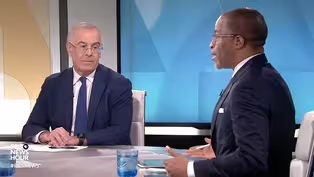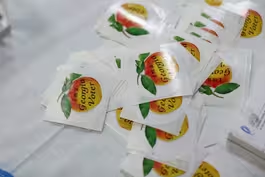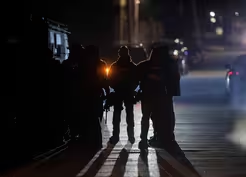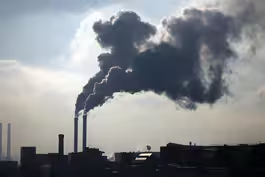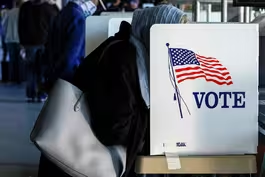
Gang violence in Haiti displaces 360,000 people
Clip: 3/29/2024 | 5m 10sVideo has Closed Captions
Brutal wave of gang violence leaves 1.4 million Haitians on brink of starvation
The UN says more than 1,500 Haitians have been killed so far this year in a situation it calls "cataclysmic." For nearly a month, the country has been engulfed in another wave of brutal gang violence. Nick Schifrin reports, and a warning, images in this story are disturbing.
Problems playing video? | Closed Captioning Feedback
Problems playing video? | Closed Captioning Feedback
Major corporate funding for the PBS News Hour is provided by BDO, BNSF, Consumer Cellular, American Cruise Lines, and Raymond James. Funding for the PBS NewsHour Weekend is provided by...

Gang violence in Haiti displaces 360,000 people
Clip: 3/29/2024 | 5m 10sVideo has Closed Captions
The UN says more than 1,500 Haitians have been killed so far this year in a situation it calls "cataclysmic." For nearly a month, the country has been engulfed in another wave of brutal gang violence. Nick Schifrin reports, and a warning, images in this story are disturbing.
Problems playing video? | Closed Captioning Feedback
How to Watch PBS News Hour
PBS News Hour is available to stream on pbs.org and the free PBS App, available on iPhone, Apple TV, Android TV, Android smartphones, Amazon Fire TV, Amazon Fire Tablet, Roku, Samsung Smart TV, and Vizio.
Providing Support for PBS.org
Learn Moreabout PBS online sponsorshipWILLIAM BRANGHAM: This week, the U.N. said over 1,500 Haitians have been killed so far this year because of a crisis it calls cataclysmic.
For nearly a month now, the country has been engulfed in another wave of brutal gang violence.
Prime Minister Ariel Henry said he would resign as soon as a transitional council is created that will select a new prime minister.
But, so far, there has been no breakthrough.
Nick Schifrin has this report.
And a warning: There are very disturbing images in this story.
NICK SCHIFRIN: This week, parts of Port-au-Prince are a shell of a city.
This capital of more than a million is burning.
Outgunned police patrol, but the streets are strewn with left-behind garbage and left-behind bodies.
There is no protection for the people.
ERIKA CHARLES, American in Port-au-Prince, Haiti: People are just waking up and seeing dead bodies.
NICK SCHIFRIN: American Erika Charles has lived in Haiti for more than a decade.
She and her family have been displaced twice from their home near the Port-au-Prince Airport.
ERIKA CHARLES: When they first attacked the airport, that really changed everybody's sense of, what do we do now?
The places where we thought were safe are no longer safe.
NICK SCHIFRIN: It was one month ago today that airport employees ran for their lives after gangs closed the airport, torched police stations, and broke into Haiti's two biggest prisons, releasing more than 4,000 inmates.
In a country used to violence, this was different, designed to bring down the government of unelected Prime Minister Ariel Henry, who assumed power after former President Jovenel Moise was assassinated in 2021.
ERIKA CHARLES: These last few weeks has taken it to a whole new level, a level that I have never seen in my decade being here.
We had to leave our home on March 3.
The night before we left, we had to move our kids into one room of the house.
We slept on the floor so that we could avoid any kind of -- the possibility of gunfire coming into our home and hurting one of us.
NICK SCHIFRIN: In nine days, U.S. government-sponsored helicopters have evacuated more than 400 U.S. citizens from Port-au-Prince to neighboring Dominican Republic.
And a U.S.-sponsored flight and now commercial planes have departed from the northern Haitian city of Cap-Haitien.
In total, 500 U.S. citizens have left.
But Charles is the guardian to twin Haitian girls who don't yet have Haitian passports, and, even if they did, the U.S. is not yet evacuating Haitian family members of U.S. citizens.
ERIKA CHARLES: As a mother, I can't - - I can't leave my kids behind.
And so we have been -- I have been talking to both Haitian and U.S. governments to see what options they can offer, and, so far, nobody can come up with a solution.
BRYAN STERN, Co-Founder, Project Dynamo: I think that if you can show a familial tie through marriage or birth or whatever, that there should be an exception.
NICK SCHIFRIN: Bryan Stern is the founder and CEO of Project Dynamo, a veteran-led nonprofit that evacuates Americans from conflict zones.
He urges the U.S. government to expand the categories of people it's evacuating from Haiti.
BRYAN STERN: I think that, if you are a green card holder and you're married to an American citizen, you should have an exception.
NICK SCHIFRIN: Project Dynamo received more than 100 rescue requests, and this week evacuated 51 American and Canadian citizens out of Port-au-Prince.
The group evacuated Americans from Sudan, Afghanistan, and Ukraine.
But Stern says evacuating Americans from Haiti through the Dominican Republic has proven especially difficult.
BRYAN STERN: The Dominican Republic is -- their government has been extremely frustrating as far as getting landing clearance and takeoff clearance and the ability to conduct operations.
It means that American citizens are stuck longer surrounded by gangs.
NICK SCHIFRIN: The Dominican Republic has closed its airspace to flights from Haiti and mostly closed the land border to Haitians, despite the humanitarian crisis.
Across Haiti, more than 360,000 people are displaced, and 1.4 million Haitians are on the brink of starvation.
GARRY CALIXTE, CORE: Day after day, people are dying, dying because of food, dying because of fear, dying because of stress.
NICK SCHIFRIN: Garry Calixte is with CORE, a humanitarian group helping feed 1,000 families.
He says the country is being choked and starved.
GARRY CALIXTE: The airport is blocked.
Some roads are blocked.
And the ports are -- is also blocked.
And you are wondering if, after maybe how many days, maybe you might not be able to find what you need as sustenance.
People have already invited me to leave the country.
But we could have a better Haiti.
I would like to live in my country in peace.
NICK SCHIFRIN: But, today, there is only war stealing the country's future.
For the "PBS NewsHour," I'm Nick Schifrin.
Brooks and Capehart on the importance of campaign spending
Video has Closed Captions
Clip: 3/29/2024 | 12m 4s | Brooks and Capehart on Biden's record fundraiser and the importance of campaign spending (12m 4s)
Georgia lawmakers pass more voting rules ahead of election
Video has Closed Captions
Clip: 3/29/2024 | 5m 28s | Georgia lawmakers pass more voting rules ahead of 2024 election (5m 28s)
How non-lethal police tactics led to 1,000 deaths
Video has Closed Captions
Clip: 3/29/2024 | 6m 39s | Police tactics meant to stop people often ends up killing them, investigation reveals (6m 39s)
The inspirations behind Beyoncé’s 'Cowboy Carter'
Video has Closed Captions
Clip: 3/29/2024 | 4m 38s | The inspirations behind Beyoncé’s genre-defying album 'Cowboy Carter' (4m 38s)
News Wrap: Salvage operation begins at bridge collapse site
Video has Closed Captions
Clip: 3/29/2024 | 6m 5s | How heavy industries contribute to climate change and what can be done to cut emissions (6m 5s)
Okla. commissioner faces recall over white nationalist ties
Video has Closed Captions
Clip: 3/29/2024 | 5m 55s | Oklahoma city commissioner faces recall election over ties to white nationalism (5m 55s)
Providing Support for PBS.org
Learn Moreabout PBS online sponsorship
- News and Public Affairs

FRONTLINE is investigative journalism that questions, explains and changes our world.

- News and Public Affairs

Amanpour and Company features conversations with leaders and decision makers.












Support for PBS provided by:
Major corporate funding for the PBS News Hour is provided by BDO, BNSF, Consumer Cellular, American Cruise Lines, and Raymond James. Funding for the PBS NewsHour Weekend is provided by...
